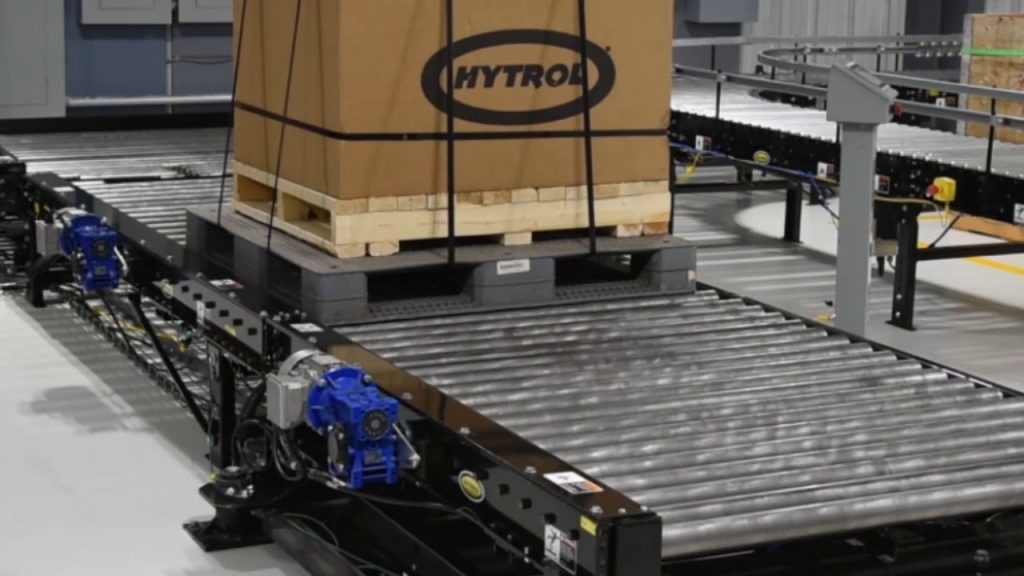1. What Are MDR Pallet Handling Conveyor Systems?
MDR stands for Motorized Drive Roller, a type of conveyor system where each roller is powered independently. This advanced technology allows for precise control of pallet movement, making it an essential tool for warehouses, manufacturing facilities, and distribution centers.
1.1 How MDR Systems Work
Unlike traditional conveyor belts, MDR systems use motorized rollers that are connected via sensors and communication modules. These sensors detect the presence of pallets and adjust the roller speed and direction accordingly.
1.2 Key Components of MDR Systems
-
Motorized Rollers: Provide motion and control over pallet movement.
-
Conveyor Belt: Used in conjunction with rollers for smooth pallet transport.
-
Control Modules: Manage speed, direction, and braking.
-
Frame and Structure: Durable materials support heavy loads and consistent operation.
-
Parts and Accessories: Modular designs allow for easy replacement of key components.
2. Benefits of MDR Pallet Handling Conveyor Systems
2.1 Improved Efficiency
MDR systems minimize manual intervention, allowing pallets to move seamlessly through complex layouts. This reduces downtime and increases overall productivity.
2.2 Reduced Energy Consumption
Since motorized rollers operate independently, they consume less power compared to traditional conveyor systems that require continuous operation.
2.3 Enhanced Safety
Sensors and automated controls reduce the risk of accidents by ensuring pallets are moved carefully and without collisions.
2.4 Scalability and Flexibility
MDR systems can be customized to fit various warehouse layouts and operational requirements. Whether you're expanding your facility or upgrading existing equipment, these systems offer unparalleled flexibility.
2.5 Cost Savings
Investing in MDR systems may have higher upfront costs, but the long-term savings in energy and labor make it a worthwhile investment.
3. Types of MDR Pallet Handling Conveyor Systems
3.1 Straight Conveyors
Straight conveyors are ideal for transporting pallets in a linear path. They are commonly used in warehouses with straightforward layouts.
3.2 Curved Conveyors
Designed for facilities with tight spaces, curved conveyors help navigate corners and maximize floor space utilization.
3.3 Zoned Conveyors
Zoned conveyors divide the system into multiple zones, each operated independently. This is useful for managing speed and direction across different sections of the conveyor.
3.4 Modular Systems
Modular MDR systems allow businesses to add or remove components based on their changing needs.
3.5 Heavy-Duty Conveyors
Ideal for handling oversized or heavy pallets, these systems are built with reinforced frames and rollers to support increased weight capacity.
4. Applications of MDR Pallet Handling Conveyor Systems
4.1 Warehousing and Logistics
MDR systems are widely used in warehouses to streamline pallet movement, inventory management, and order fulfillment.
4.2 Manufacturing
In production facilities, MDR conveyors transport raw materials and finished goods efficiently, reducing bottlenecks in the assembly line.
4.3 Distribution Centers
MDR systems ensure quick and accurate movement of pallets, improving delivery times and customer satisfaction.
4.4 Retail and E-Commerce
With the growth of online shopping, MDR conveyors are increasingly used to manage high volumes of pallets in fulfillment centers.
4.5 Food and Beverage Industry
These systems are designed to handle pallets containing perishable goods, ensuring fast and safe transport.
5. Choosing the Right MDR Pallet Handling Equipment
5.1 Assessing Your Needs
Start by evaluating the size, weight, and volume of pallets you need to handle. This will help you determine the type of MDR system best suited for your operations.
5.2 Comparing Features
Look for systems with advanced features like automated controls, modular designs, and energy-efficient components.
5.3 Considering Durability
Choose systems made from high-quality materials to ensure they can withstand daily use and heavy loads.
5.4 Reviewing Costs
While price is an important factor, consider the long-term benefits of investing in durable and efficient systems.
5.5 Exploring Options
Platforms offering MDR Pallet Handling Conveyor For Sale often provide detailed specifications and pricing, making it easier for businesses to compare options.
6. Challenges in Using MDR Systems
6.1 Initial Investment
The upfront cost of MDR systems can be higher than traditional conveyor belts. However, the long-term savings often outweigh these initial expenses.
6.2 Maintenance
While MDR systems are durable, regular maintenance is essential to ensure optimal performance. Spare parts like MDR Pallet Handling Conveyor Parts should be readily available.
6.3 Space Requirements
Some facilities may struggle to incorporate MDR systems due to limited floor space. Modular designs can help overcome this challenge.
7. Future Trends in MDR Pallet Handling Solutions
7.1 Integration with IoT
The Internet of Things (IoT) is revolutionizing material handling by enabling real-time monitoring and predictive maintenance for MDR systems.
7.2 AI and Automation
Artificial intelligence is enhancing the capabilities of MDR systems, allowing for smarter routing and improved operational efficiency.
7.3 Sustainability
Manufacturers are increasingly focusing on energy-efficient designs to align with environmental regulations and reduce carbon footprints.
7.4 Customization
Future MDR systems will offer even greater customization options, ensuring businesses can adapt to changing needs more effectively.
Market Data: MDR Conveyor Systems Adoption
The following table highlights the growing adoption of MDR pallet handling conveyor systems in the U.S.:
|
Year
|
Market Size (in billion USD)
|
Adoption Rate
|
|
2020
|
1.5
|
45%
|
|
2022
|
2.2
|
55%
|
|
2025 (Projected)
|
3.0
|
70%
|
Source: Statista and Industry Reports (2023)
MDR Pallet Handling Conveyor Systems are transforming the logistics and manufacturing industries by offering efficient, scalable, and cost-effective solutions. From improving operational efficiency to reducing energy consumption, these systems are an investment in the future of material handling. By understanding your needs and exploring available options, you can leverage MDR systems to optimize your business operations and stay ahead in a competitive market.

